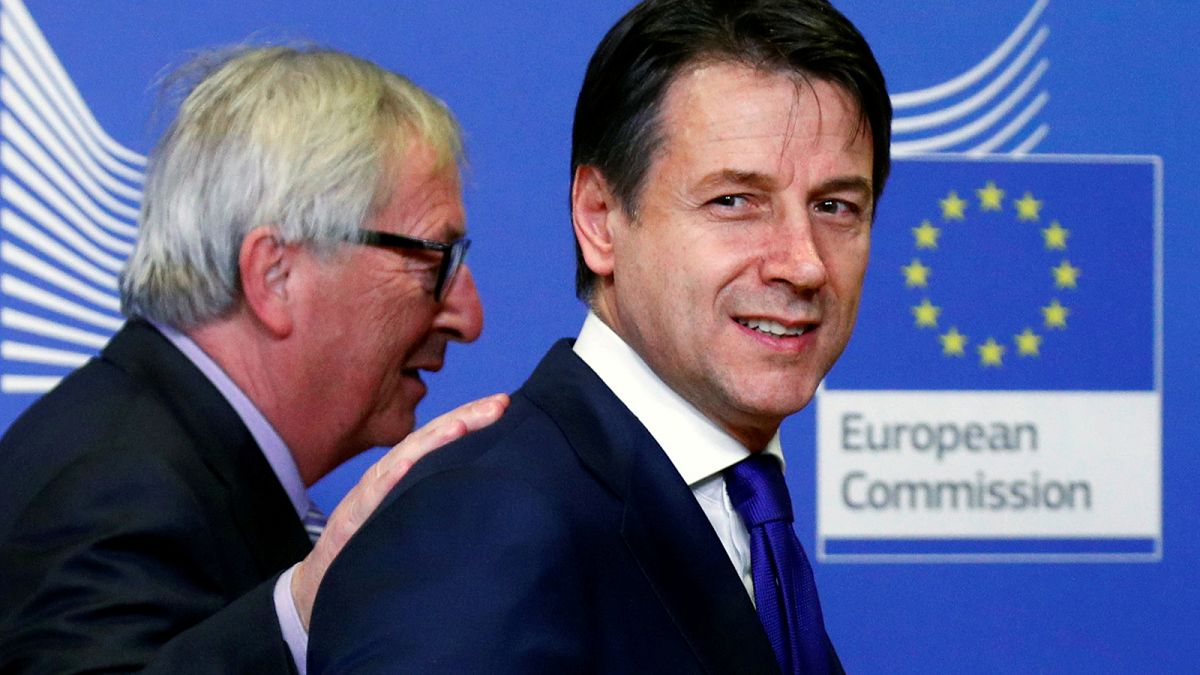2018 review: EU and Rome at loggerheads over budget and debt
The Italian shoe industry is well known all over the world, but who would have ever imagined that a shoe would have become the symbol of the tensions between Rome and Brussels?
In October an Italian MEP stamped his "Made in Italy" shoe on Commissioner Moscovici's speech criticizing Italy's budget draft. This MEP said that "Italy deserves respect and these euro-dumbos must understand it".
How did we get here? Here’s a little reminder of how Rome versus Brussels panned out during 2018:
It all began in June, when the new populist government got into power. The two coalition parties, the anti-establishment 5-Star movement and the far-right Lega, often accused the EU of hammering Italy with austerity. During their electoral campaign they both promised lower taxes, a minimum basic income and an early retirement scheme.
But when it came to submitting the draft budget for 2019, the government’s promises crashed head-first into reality. The European Commission wanted Italy to respect fiscal rules, reduce its public debt and set a budget deficit of 1.8% of GDP. Italy, on the contrary, presented a budget plan that hiked the deficit up to 2.4 of GDP.
Rome believed its expansive economic policy would boost economic growth, while the Commission affirmed that it would have only increased public debt. Because this budget plan allocates 37 billion euros, out of which 22 would be financed by borrowing money from the financial markets.
After Greece, Italy has the highest debt in Europe and is the third largest economy in the eurozone. Economists agree that the risk of its debt becoming unsustainable is a threat for all the eurozone, with France the most exposed to collateral damage.
Maria Demertzis, an economist at Bruegel told Euronews:
"French banks have a lot of Italian debt, the French economy relies a lot on the Italian economy, so if something goes wrong on the Italian economy either in the markets or in the debt, that could really hurt France."
But when confronted with warnings from Brussels, Italian Deputy Prime Minister Matteo Salvini fired back at the so-called 'EU bureaucrats,' saying:
"The enemies of Europe are those sealed in the bunker of Brussels. It's Juncker and Moscovici who have brought fear and job insecurity to Europe."
With Italy remaining firm on its stance, in November the European Commission said the plan was in serious non-compliance with EU fiscal rules and warranted the opening of an "excessive deficit procedure."
Have a listen to the concerns of Commissioner for Economic Affairs, Pierre Moscovici:
"Who will pay the bill for this extra-spending? We continue to believe that this budget carries risks for Italy’s economy, for its companies, for its savers and for its taxpayers."
That statement was intended to put pressure on Italy to climb down. If taken to the limit, this process could lead to the imposition of fines on Italy, a punishment unprecedented in the euro’s 20-year lifetime. But when asked to reply to the letter of the Commission, Salvini said, "I was also waiting for Santa Claus’s letter. We will discuss politely as we have always done. We will go on".
In the meanwhile the big-spending budget plan has sent interest rates up and other EU leaders continued to warn Italy to change its mind.
Confronted with the gravity of the situation, Rome toned down its rhetoric with Brussels, proposing to reduce the deficit to 2.04%. However that was not enough. After days of exhausting negotiations on December 19, a compromise was reached: Italy recognized that its plan was not able to boost the economy as much as foreseen and gave the Commission further guarantees on its structural deficit.
The compromise arrived just in time for Christmas. But this year the panettone has a bitter taste. For now, the country has managed to avoid the painful consequences of a disciplinary measure but it will remain under the monitoring of the European Commission.
